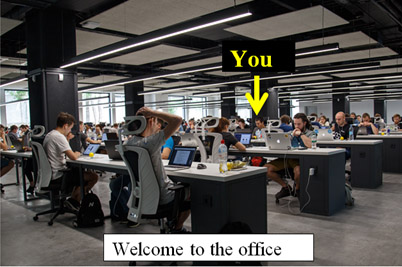NDT UPSKILLING:
Mid-career lane changing
You’re an NDT technician; why do you want to change?
Being an NDT technician can be a good steady job. You’ve got a large choice of employers, the salary is quite good (£30-50k p.a. with an average of about £42k p.a. if you believe the surveys) and once you’ve become familiar with it; the job itself is not too taxing. There’s also room to diversify; you can become certificated in new NDT techniques, progressing through levels 1, 2 and 3 certifications as you go. So why are you reading this article?

NDT is repetitive
This gets to be a problem for some people. In some roles you can get stuck in a groove doing much the same NDT technique day after day, week after week. This is particularly the case for on-site jobs such as construction of pipelines, steelwork, boilers or general pressure equipment. It’s much the same in a factory NDT role, if you are in the general fabrication or manufacturing industries.
NDT requires you to travel
Just about all NDT positions, with the exception of shop-based construction, require you to travel to different sites and locations. Most people like this for a while but the novelty wears off as the years pass by.
In NDT you are told what to do
True enough. Working practices are fairly flexible in that you are generally left to get on with the job but there are still project scopes and timescales to be met and someone not too far away to report to.
Personal fitness requirements
This becomes a particular consideration in offshore in-service inspection. Despite the increase in drones and other remote methods, a lot of NDT is still done by rope access methods. This means that operators have to meet fitness requirements and remain happy suspended on a rope day after day. Normal non rope-access NDT also needs a degree of fitness in order to get into vessels and confined spaces. Some people have no problem (there are plenty of middle-aged mountaineers around) but others find it more difficult or perhaps stop trying as hard as they get older.
Lane-changing possibilities
Changing career lanes to get out of hands-on NDT is not quite as easy as it first appears. There’s not too many routes open, so most of the changes fall into one of four main destinations;
- Changing to an office-based role as NDT specialist or coordinator, with maybe occasional travel to site
- Moving ‘off the tools’ into plant inspection
- Teaching NDT
- Working on NDT ‘technology’ with an equipment manufacturer.
Each of these has their advantages and limitations. Some also have entry-barriers; mainly qualifications and certificate requirements that you will need to address. A final consideration is the age you are when you wish to make the change; age can limit, or expand, opportunities depending on the characteristics of the role, and the employer. Let’s look at each in a little more detail;
Changing to an office-based role
This sounds easy and not too disruptive, and sometimes it can be. It is the most common change where you have built up a good relationship with your NDT employer over time and want to stick with each other. The good news is that you probably won’t immediately need any more qualifications or certificates to take the job. Your employer will probably suggest some longer-term qualification or other but there’ll be time to get used to the idea.
This type of move is always helped if you already live (very) near the office so you can turn up for work every day without much disruption. For the first few weeks you’ll find it wonderful; no helicopter trips, no travel delays (just the 8am and 5pm traffic jams) and your own nice desk.

Once this novelty has worn off, then whether it becomes a long-term success for you depend on how much you like working in an office day after day. Office work consists of sitting at a computer, attending meetings and reading and writing things, in about that order of frequency. It doesn’t matter that much whether you are involved as an NDT ‘specialist’ or an operational coordinator, the physical activities are much the same, it’s just the content that differs. Make sure you bag yourself a nice seat in the office; in twenty years’ time you might still be in it.
You may be lucky and attain a bit of status in your new role, and be someone’s boss. You’ll need to balance this however with the fact that you will probably have more bosses and their bosses, above you, than you actually did before. It’s cast-iron guaranteed that some of these will be good to work for, and others will be those type of head office people you used to talk about when you were an NDT technician, so don’t be surprised when this is what you find.
Moving ‘off the tools’ into plant inspection
There are many different roles in the world of plant inspection; you can see them in the referenced articles on our Integrity Job Role webpage. Plant inspection is a monitoring and reporting role, rather than a ‘doing’ job, so there is less physical activity required and more variety. A significant role of the plant inspector is monitoring the work and results of NDT personnel so knowledge of NDT is a useful asset to have. This makes it an attractive route for NDT technicians looking for a change. A few points are worth bearing in mind;
- Location. Most of the work still involves travel and visiting sites, but mainly for short visits rather than being resident there for weeks on end.
- Technical knowledge. You will need to increase this significantly. NDT knowledge is useful but only makes up 15-20% of what you need to know as a plant inspector. You will need to build up new knowledge on equipment construction, operation, materials, damage mechanisms, statutory regulations and a mass of technical codes and standards.
- Freelance work. If you manage to become make a success of it, you will find freelance and part-time work in plant inspection easier to find than in the world of NDT. The work available is also more varied, and interesting. The salaries can be better too, depending on what type of inspection position you get.
- Certification and qualifications. Plant inspection has its own system of personnel certification so before long you will need to get your foot on this ladder. The ones that are taken most seriously are the API (American Petroleum Institute) certs. See our API Certifications article and Exam Calendars page for details.
- Setting your sights. If you want a home-based job and feel you don’t want to set your sights too high then the Small plant engineer surveyor role can be a good first ‘upskilling’ step into in-service inspection. You’ll still have new stuff to learn though; try out our technical quiz; small plant surveyor and see how you do at the questions. You can also see a success story about this career change route.
Becoming an NDT teacher
There are plenty of NDT training companies around that always need NDT trainers; full-time, part-time or freelance; it’s up to you. The good thing about this route is that you don’t need to commit yourself for life. You can give it a try and see if you like.
Good points
- It’s very interesting dealing with all the varied characters and personalities
- It’s a superb chance to improve your own technical knowledge
- Time flies by when you are training, and every day is different
- The pay is good if you are a freelancer; and so-so if you’re a staff employee.
Not-so-good points
- Repetition is the order of the day; you can end up presenting the same course a hundred times per year. You will be expected to maintain your enthusiasm for each and every one.
- For every group of trainees that wants to learn there are always one or two that just aren’t interested, and they’re sitting in your class. You have to find ways to get these characters motivated.
- You’ll be surprised at just how physically tiring training can be
- Trainees ask you questions and expect you to know all the answers. If you don’t, you lose your credibility and look like a lemon.

Working on NDT ‘technology’ with an equipment manufacturer.
If you have a genuine interest in NDT equipment and technology, rather than just a genuine interest in having a job, then this can be an interesting route. For an NDT technician, it will never be the easiest step to take however; equipment manufacturers generally value academic and scientific qualifications above NDT certificates for equipment design and development roles. This is probably justified, as new NDT techniques are becoming increasingly complex and automated.
Some NDT technicians do manage to make a transition to an equipment manufacturer. There are roles in equipment field testing, validation etc. that arise from time to time but it would be wrong to suggest that there are lots of them. If you do fancy this route then it’s probably best to make the change early in your career (under 30) and back it up with some formal academic qualifications to improve your technical credibility.
Finally, the Total Pivot
If you upskill from an NDT technician to any of the jobs above, you’ll still be connected to the world of NDT in some way. If you’ve really had enough of it, and want a total change, then make a total pivot and change to something completely different. If you are a good salesperson, then sell things, anything. If you like working with your hands, then make things (then sell them). Whatever it is, make sure it’s what you like doing and what will make you happy in the future.
A final note of caution: watch out for the 50-40-30 scam
If you are going to make a major shift in career direction out of NDT, and I mean a big one, the earlier you start this in your career, the better it will work. Just be careful that in the New world of freelance work and the gig economy you don’t get caught out by the old 50-40-30 scam; working 50 hours per week for some company for 40 years, hoping to retire on a pension of 30% of what wasn’t quite enough before. Many a competent, fair-minded person has been snared by this.
DID YOU FIND THIS ARTICLE USEFUL?
Who are we?
The Matthews Integrity Hub: HEAD OFFICE website is here to provide you with an up-to-the-minute information mix designed to help you with your lifework and career development in the asset integrity, inspection and NDE industries. It’s for technical job-do-ers new and old, job-movers, the job-curious, the ambitious, the mildly-complacent, the dissatisfied, the mid-life lane-changers, the recognition-hungry and the slippery ladder-climbers amongst us. If you are working in the asset integrity industry, then it’s for you.
We offer a TRIAL TECHNICAL INTERVIEW
If you want to check your knowledge for a specific job role in the integrity industry then try our trial technical interview. Its purpose is to test you on the technical aspects of the job you are thinking of applying for. There’s no time limit on it but expect it to last at least 20 minutes. After the discussion we’ll give you honest feedback on how you did. Just let us know the type of position you are going for; we’ll do the rest and respond with at time slot for you to call us.
There’s no charge, but we will expect you to call us at the allocated time and be ready to answer technical questions.
Remember your trial interview is on a purely technical subjects. We are not interested in you personality traits, do-gooding activities or any wonderful extra-curricular interests you may have.







